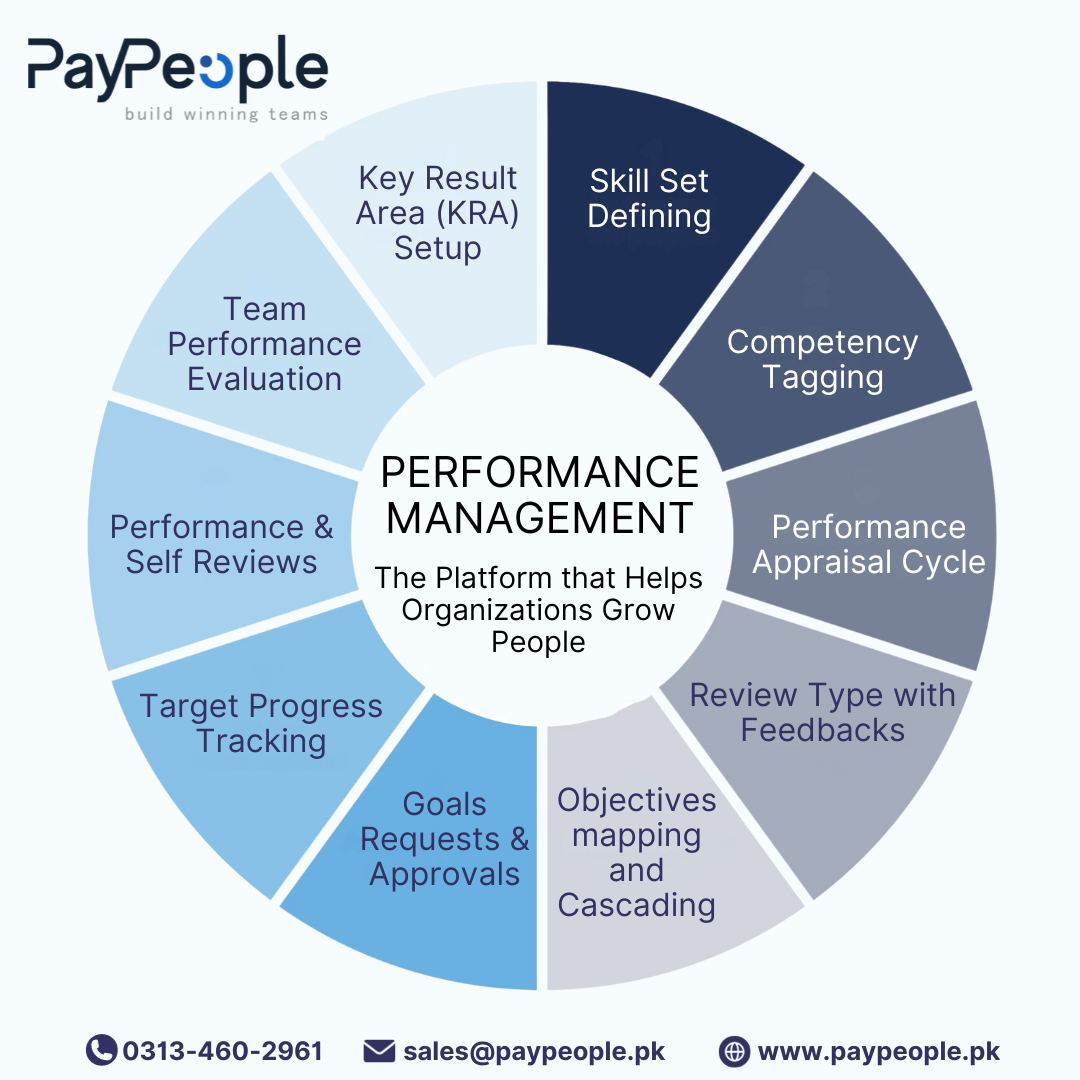Paypeople # 1 is one of the top Human Resources Administration that plays a pivotal role in the success of any organization by effectively managing its most valuable asset – its workforce. One crucial aspect of HR Administration is the handling of employee performance evaluations and feedback. This process is not merely a routine task but a strategic initiative that contributes to employee development, organizational growth, and the overall success of the business.
Click to Start Whatsapp Chat with Sales
Call #:+923333331225
Email: sales@Paypeople.pk
Paypeople # 1 Human Resources Administration

How Human Resources Administration handle employee performance?
The Importance of Performance Evaluations
Employee performance evaluations serve as a cornerstone for talent management within an organization. These assessments provide a structured framework for assessing an employee’s contributions, strengths, and areas for improvement. By conducting regular performance evaluations, the Human Resources Administration can gauge employee effectiveness, align individual goals with organizational objectives, and foster a culture of continuous improvement.
Goal Setting
The performance evaluation process often begins with the establishment of clear and measurable goals for each employee. HR collaborates with departmental managers and team leaders to align individual objectives with the broader organizational strategy. Well-defined goals create a roadmap for employees, helping them understand expectations and contribute meaningfully to the organization’s success.
Data Collection and Analysis
HR Administration gathers relevant data to assess employee performance objectively. This may include quantitative metrics, such as sales figures or project completion rates, as well as qualitative feedback from managers, peers, and even self-assessment by employees. Leveraging this data allows HR professionals to gain a comprehensive understanding of an individual’s contributions and areas that require attention.
Performance Appraisal Tools
To streamline the evaluation process, Human Resources Administration often utilizes performance appraisal tools and software. These tools help in standardizing assessments, ensuring consistency, and providing a centralized platform for storing and analyzing performance data. By embracing technology, HR can enhance the efficiency and accuracy of the evaluation process, making it more transparent and accessible to relevant stakeholders.
The Role of HR in Feedback Mechanisms
Feedback is a fundamental component of performance evaluations, serving as a powerful tool for employee development. HR Administration plays a crucial role in establishing and facilitating effective feedback mechanisms within the organization.


How Human Resources Administration handle employee performance?
Constructive Feedback
Recruitment software works closely with managers to ensure that feedback provided during performance evaluations is constructive and actionable. Instead of focusing solely on shortcomings, constructive feedback emphasizes areas for improvement while acknowledging an employee’s strengths. This approach fosters a positive and growth-oriented mindset among employees.
Continuous Feedback
While annual or semi-annual performance evaluations are common, HR Administration recognizes the need for continuous feedback throughout the year. This ongoing dialogue between managers and employees enables timely course corrections, promotes a culture of open communication, and ensures that performance issues are addressed promptly.
Training and Development
HR identifies skill gaps and areas for improvement highlighted during performance evaluations and collaborates with training and development teams to design targeted programs. These initiatives are essential for nurturing employee growth, enhancing skills, and aligning individual development with organizational needs.
Employee Involvement in the Process
An effective performance evaluation system involves employees in the process, making it a collaborative effort rather than a top-down imposition. Performance Management in HRM facilitates this by encouraging self-assessment, soliciting employee input on goal setting, and incorporating their perspectives into the evaluation process.
Self-Assessment
Encouraging employees to assess their own performance provides valuable insights into their perceptions, aspirations, and areas they believe need improvement. HR Administration uses self-assessment as a tool for self-reflection and as a basis for constructive dialogue during formal evaluations.
Employee Development Plans
HR collaborates with employees to create personalized development plans based on the outcomes of performance evaluations. These plans outline specific actions, resources, and timelines for achieving performance improvement goals. Involving employees in the formulation of these plans fosters a sense of ownership and commitment to their professional development.
Conclusion
In conclusion, HR Administration’s role in employee performance evaluations and feedback is integral to an organization’s success. By establishing clear goals, leveraging data-driven insights, facilitating constructive feedback mechanisms, and involving employees in the process, HR contributes to a culture of continuous improvement and individual growth. Overcoming challenges and embracing customized approaches further enhance the effectiveness of performance evaluations, making them a strategic tool for talent management and organizational development. As HR continues to evolve, its ability to drive impactful performance evaluations will remain a key factor in shaping the success of modern businesses.
Click to Start Whatsapp Chat with Sales


Call #:+923333331225
Email: sales@Paypeople.pk
Human Resources Administration
Human Resources Administration
Human Resources Administration
Human Resources Administration
We are one of the best How Human Resources Administration handle employee performance? Price in Pakistan in Azad Kashmir, Bagh, Bhimber, khuiratta, Kotli, Mangla, Mirpur, Muzaffarabad, Plandri, Rawalakot, Punch, Balochistan, Amir Chah, Bazdar, Bela, Bellpat, Bagh, Burj, Chagai, Chah Sandan, Chakku, Chaman, Chhatr, updated on 2024-07-25T20:51:51+00:00 Dalbandin, Dera BugtiBarcode Shop offer lowest How Human Resources Administration handle employee performance? Price Face Recognition in cities Dhana Sar, Diwana, Duki, Dushi, Duzab, Gajar, Gandava, Garhi Khairo, Garruck, Ghazluna, Girdan, Gulistan, Gwadar, Gwash, Hab Chauki, Hameedabad, Harnai, Hinglaj, Hoshab, Ispikan, Jhal, Jhal Jhao, Jhatpat, Jiwani, Kalandi, Kalat, Kamararod, Kanak, Kandi, Kanpur, Kapip, KapparWe can deliver Face Recognition in Karodi, Katuri, Kharan, Khuzdar, Kikki, updated on 2024-07-25T20:51:51+00:00 Kohan, Kohlu, Korak, Lahri, Lasbela, Liari, Loralai, Mach, Mand, Manguchar, Mashki Chah, Maslti, Mastung, Mekhtar, Merui, Mianez, Murgha Kibzai, Musa Khel Bazar, Nagha Kalat, Nal, Naseerabad, Nauroz Kalat, Nur Gamma, Nushki, Nuttal, Ormara, Palantuk, Panjgur, Pasni, Piharak, Pishin, Qamruddin Karez, Qila Abdullah, Qila Ladgasht and this was updated on 2024-07-25T20:51:51+00:00 We also deal with How Human Resources Administration handle employee performance? Price in Qila Safed, Qila Saifullah, Quetta, Rakhni, Robat Thana, Rodkhan, Saindak, Sanjawi, Saruna, Shabaz Kalat, Shahpur, Sharam Jogizai, Shingar, Shorap, Sibi, Sonmiani, Spezand, Spintangi, Sui, Suntsar, Surab, Thalo, Tump, Turbat, Umarao, pirMahal, Uthal, Vitakri, Wadh, Washap, Wasjuk, Yakmach, Zhob, Federally Administered Northern Areas/FANAWe are already sent Face Recognition to these places – Astor, updated on 2024-07-25T20:51:51+00:00 Baramula, Hunza, Gilgit, Nagar, Skardu, Shangrila, Shandur, Federally Administered Tribal Areas/FATA, Bajaur, Hangu, Malakand, Miram Shah, Mohmand, Khyber, Kurram, North Waziristan, South Waziristan, Wana, NWFP, Abbottabad, Ayubia, Adezai, Banda Daud Shah, Bannu, Batagram, Birote, Buner, Chakdara, Charsadda, Chitral, Dargai, Darya Khan, Dera Ismail Khan and this was updated on 2024-07-25T20:51:51+00:00 we are planning to open a branch office of in Drasan, Drosh, Hangu, Haripur, Kalam, Karak, Khanaspur, Kohat, Kohistan, Lakki Marwat, Latamber, Lower Dir, Madyan, Malakand, Mansehra, Mardan, updated on 2024-07-25T20:51:51+00:00 Mastuj, Mongora, Nowshera, Paharpur, Peshawar, Saidu Sharif, Shangla, Sakesar, Swabi, Swat, Tangi, Tank, Thall, Tordher, Upper Dir, Punjab, Ahmedpur East, Ahmed Nager Chatha, Ali Pur, Arifwala, Attock, Basti Malook, BhagalchurFace Recognition in Bhalwal, Bahawalnagar, Bahawalpur, Bhaipheru, Bhakkar, Burewala, Chailianwala, Chakwal, Chichawatni, Chiniot, Chowk Azam, Chowk Sarwar Shaheed, Daska, Darya Khan, Dera Ghazi Khan, Derawar Fort, updated on 2024-07-25T20:51:51+00:00 Dhaular, Dina City, Dinga, Dipalpur, Faisalabad, Fateh Jang, Gadar, Ghakhar MandiFace Recognition How Human Resources Administration handle employee performance? Price s Demands very high in Gujranwala, Gujrat, Gujar Khan, Hafizabad, Haroonabad, Hasilpur, Haveli Lakha, Jampur, Jhang, Jhelum, Kalabagh, Karor Lal Esan, Kasur, Kamalia, Kamokey, Khanewal, Khanpur, Kharian, Khushab, Kot Addu, Jahania, Jalla Araain, Jauharabad, Laar, Lahore, Lalamusa, Layyah, Lodhran, Mamoori, Mandi Bahauddin, Makhdoom Aali, Mandi Warburton, Mailsi, Mian Channu, Minawala, Mianwali, Multan, Murree, Muridke, Muzaffargarh, Narowal, Okara, Renala Khurd, Rajan Pur, Pak Pattan, Panjgur and this was updated on 2024-07-25T20:51:51+00:00 and current How Human Resources Administration handle employee performance? Price of is Rs 100 in Pattoki, Pirmahal, Qila Didar Singh, Rabwah, Raiwind, Rajan Pur, Rahim Yar Khan, Rawalpindi, Rohri, Sadiqabad, Safdar Abad – (Dhaban Singh), Sahiwal, Sangla Hill, Samberial, Sarai Alamgir, Sargodha, Shakargarh, Shafqat Shaheed Chowk, Sheikhupura, Sialkot, Sohawa, Sooianwala, Sundar (city), Talagang, Tarbela, Takhtbai, Taxila, Toba Tek Singh, Vehari, Wah Cantonment, Wazirabad and this was updated on 2024-07-25T20:51:51+00:00 Software solutions are widely available with Price updated on 2024-07-25T20:51:51+00:00 in Sindh, Ali Bandar, Baden, Chachro, Dadu, Digri, Diplo, Dokri, Gadra, Ghanian, Ghauspur, Ghotki, Hala, Hyderabad, Islamkot, Jacobabad, Jamesabad, Jamshoro, Janghar, Jati (Mughalbhin), Jhudo, Jungshahi, Kandiaro, Lahore, Kashmor, Keti Bandar, Khairpur, updated on 2024-07-25T20:51:51+00:00 Khora, Klupro, Khokhropur, Korangi, Kotri, Kot Sarae, Larkana, Lund, Mathi, Matiari, Mehar, Mirpur Batoro, Mirpur Khas, Mirpur Sakro, updated on 2024-07-25T20:51:51+00:00 Mithi, MithaniThe Barcode Shop deliver high quality Face Recognition in updated on 2024-07-25T20:51:51+00:00 Moro, Nagar Parkar, Naushara, Naudero, Noushero Feroz, Nawabshah, Nazimabad, Naokot, Pendoo, Pokran, Qambar, Qazi Ahmad, Ranipur, Ratodero, Rohri, Saidu Sharif, Sakrand, Sanghar, Shadadkhot, Shahbandar, Shahdadpur, Shahpur Chakar, Shikarpur, Sujawal, Sukkur, Tando Adam, Tando Allahyar, Tando Bago, Tar Ahamd Rind, Thatta, Tujal, Umarkot, Veirwaro, Warah and this was updated on 2024-07-25T20:51:51+00:00
18-1-2024

